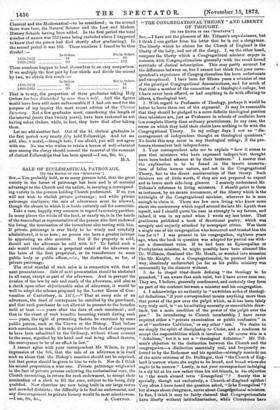SALE OF ECCLESIASTICAL PATRONAGE.
[TO THE EDITOR OF THE SPECTATOR."]
SIR, —You probably hold, as so many persons hold, that the great variety in the forms of patronage has been and is of material advantage to the Church and the nation, in securing a correspond- ing variety in the persons holding Church preferment. If so, you will not wish to abolish private patronage ; and while private patronage continues, the sale of advowsons must be allowed, though the abuses to which it is liable certainly call fcr correction.
Take a case, happily very common in regard to country parishes. In many places the whole of the laud, or nearly so, is in the hands of the descendant or representative of the person who first endowed the living, the nomination of the incumbent also resting with him. If private patronage is ever likely to be wisely and carefully administered, it is so here ; no person can have a greater interest in appointing an able minister. But if the property is sold, should not the advowson be sold with it? To forbid such a sale would involve either a perpetual entail of the advowson on the heirs of the first proprietor, or its transference to some public body or public officer,—i.e., the destruction, so far, of private patronage.
The chief scandal of such sales is in connection with that of next presentations. Sale of next presentation should be abolished in all cases, except as part of the advowson. And to prevent the evasion of the law by sale and resale of the advowson, and also as a check upon other objectionable sales of advowson, it would be well to adopt the scheme proposed by the Lower House of Con- vocation of Canterbury, in 1871,—" That at every sale of an advowson, the deed of conveyance be enrolled by the purchaser, and that such purchaser be not allowed to present to the benefice until at least — years after the date of such enrolment ; and that in the event of such benefice becoming vacant during such — years, the right of presenting thereto be exercised by some public patron, such as the Crown or the Bishop. That before such enrolment be made, it be requisite for the deed of conveyance to have been submitted to the Ordinary, without whose consent to the same, signified by his hand and seal being affixed thereto, the conveyance to be of no effect in law."
I cannot agree with your correspondent Mr. Wilson, in your impression of the 8th, that the sale of an advowson is in itself such an abuse that the Bishop's sanction should not be required, but that power should be given to him to veto it. ' Nor do I think his second proposition a wise one. Private patronage originated in the fact of private persons endowing the ecclesiastical cure, the , Church consenting, in return for such endowment, to accept their nomination of a clerk to fill the cure, subject to his being duly qualified. New churches are now being built in our large towns and crowded districts; the difficulty is to find an endowment, and any discouragement to private bounty would be most mischievous.


































 Previous page
Previous page